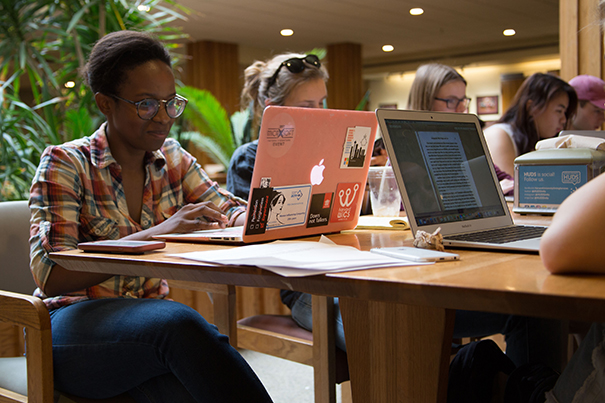
Peer Research Fellow Lisa Chille ’18 takes part in a “rise and research” session at Currier House.
Kaitlin Buckley/Harvard Library Communications
Students helping students
Peer Research Fellows at Harvard Library help undergrads tackle tough research questions
It’s up to Lisa Chille ’18 to steer the boat in the right direction when she races with the Harvard Heavyweights. In her role as coxswain on the crew team, she gains the trust of her teammates, harnessing their power and coordinating their movements toward a successful finish.
Chille also balances leadership and teamwork in her academics. As a Peer Research Fellow, she helps Currier House undergraduates maneuver challenging research questions.
Chille arrived at Currier three years ago with a background in computer science, physics, chemistry, math, and music. Writing papers in the humanities presented a brand-new challenge. House-wide emails from Alexis Gomez, a Peer Research Fellow, invited residents to stop by and get help with assignments.
“Having a friend who’s not a teacher or a teaching assistant saying ‘I can help out’ was such a huge resource for me,” Chille said. “I wanted to do this for other people as well.” Now a computer science concentrator with a secondary concentration in music, Chille teaches her peers how to navigate library resources and connect with librarians.
Currier House residents gathered in D-Hall on a recent Sunday morning to “rise and research,” fueled by Union Square Donuts and coffee. Peer Research Fellows lead and organize the study sessions, where students can get one-on-one support or tackle papers and projects in the company of their friends.
“It’s a nonjudgmental space for people to ask research questions that they think are basic, but are actually pretty hard,” Chille said. “If you show up and say, ‘I’m lost,’ I’ll say, ‘Great! Let’s start from there.’”
Librarians Ramona Islam and Anna Assogba started the Peer Research Fellow program as a way to reach out to undergraduates in the places they live and study. The program was piloted in Adams and Currier houses in 2015 before expanding to offer support via residents in all four House neighborhoods: the Quad, River Central, River East, and River West.
“We hope that students find it easier and less intimidating to ask for help from their peers,” Islam said.
Freshmen are introduced to library resources through expository writing classes, but their research needs to grow more sophisticated as they choose their concentrations and prepare for careers. Students on either side of the fellows program assist each other by learning new skills and strategies that not only help them with a one-off question, but become strengths they will have throughout their lives.
Mentor librarians who train the Peer Research Fellows also gain a new perspective on working with students.
“I’m inspired by their intellectual curiosity,” Islam said. “The fellows are interested in providing the best support possible, whether on their own or by crowdsourcing a question.”
Many interactions with undergrads consist of a brief chat at a reference desk or a one-time class visit. By working with the fellows and hosting social events for the program, librarians get the opportunity to know students better and glimpse what their Harvard experiences are like.
“I’ve learned so much from them,” said mentor librarian Dorothy Barr. “About student life, new ways of looking at library resources, new technologies. I love when they share their ideas, questions, pictures of their travels, insights — they make me feel better about the world in which we live today.”




